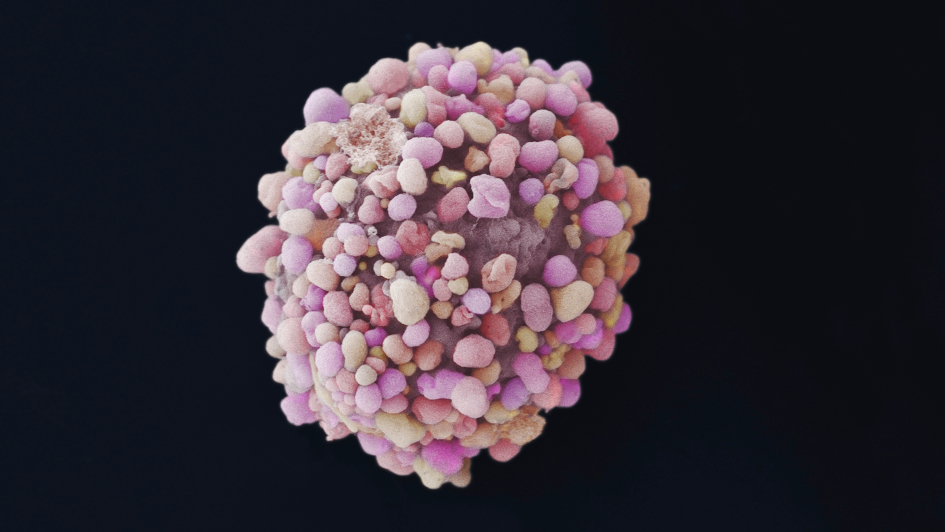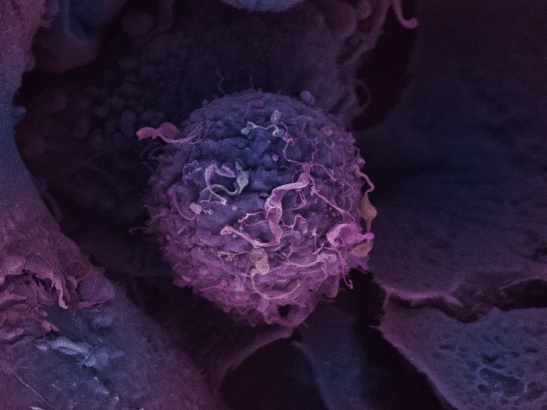
Photo: Breast cancer cell. Credit: Anne Weston via the Wellcome Collection
Scientists have discovered the key role of a series of proteins in the survival of some triple negative breast cancers. The discovery suggests there could be a new way to treat the disease.
The research shows how some triple negative breast cancer cells express a gene normally only involved in meiosis, the process of sperm and egg cell formation. When this meiosis gene is “switched on” the cancer cells become dependent on a family of proteins for their survival, which makes these proteins potential drug targets.
The scientists, from the Breast Cancer Now Toby Robins Research Centre at The Institute of Cancer Research, London, and King’s College London, believe that blocking the function of these proteins could be a potential selective treatment strategy against cancer cells for those with triple negative breast cancer that have "switched on" this meiosis gene.
The role of HORMAD1
Triple negative breast cancer is characterised by the lack of the HER2 protein and two hormone receptors – for oestrogen and progesterone. These cancers tend to be much more aggressive and difficult to treat because therapies that target those receptors do not work against them. Targeted treatment options are urgently needed for triple negative breast cancer.
Previous research from scientists at the ICR and King’s College London showed that 60 per cent of triple negative breast cancers express high levels of a particular gene called HORMAD1, a gene normally only expressed in the testes and ovaries.
HORMAD1 is usually involved in breaking and repairing the DNA’s double strand structure within reproductive tissues as part of the normal shuffling of the inherited genes from parents in an individual’s egg or sperm cells. But in cancer cells the gene appears to become inappropriately ‘switched on’ in other tissues and its presence can cause unwanted double-strand breaks in the DNA, making the cell genome unstable creating other mutations and chromosome instability – a hallmark of cancer.
To combat the genome instability, the cancer cells learn to depend on a set of proteins, called translesion synthesis (TLS) polymerases, to enable them to function correctly. This study, published in Oncogene, showed that blocking the function of the TLS proteins and other genes involved in ’DNA replication stress’ caused the cancer cells to die.
Discovering new therapeutic targets
The research, funded by Breast Cancer Now, showed the dependency of HORMAD1 on TLS polymerases by creating cell models with induced high levels of HORMAD1 as seen in some triple negative breast cancer cells.
Scientists were able to ‘switch off’ individual proteins within the cell model enabling them to investigate which proteins are key for the cell to function. They discovered that if HORMAD1 is present, ‘switching off’ certain TLS polymerases, caused more than 50 per cent of the cells to die.
‘Switching off’ proteins can mimic how drugs may block the function of proteins. The discovery of the sensitivity of the cells to ‘switching off’ TLS polymerases exposes a vulnerability that could be targeted and exploited in the treatment of triple negative breast cancer.
Significance and future work
The scientists stressed that although the identification of these targets offers a potentially exciting opportunity in the treatment of triple negative breast cancer, the science is at an early stage and extensive further research is required to validate these targets and find molecules that can target these proteins.
The research also suggests the presence of HORMAD1 in triple negative breast cancer cells could act as an indicator, or biomarker, of whether a patient might benefit from targeted treatment with therapies that act against cancers with high levels of genome instability – such as PARP inhibitors.
Study leader Professor Andrew Tutt, Director of the Breast Cancer Now Toby Robins Research Centre at the ICR and Director of the Breast Cancer Now Research Unit at King’s College London, said:
“This work between Professor Chris Lord and my own group at the ICR with Dr Anita Grigoriadis and her team at King’s College London, builds on the research our labs have conducted together into HORMAD1 and genomic instability in triple negative breast cancer.
“The discovery of the dependence of cells on TLS polymerases when HORMAD1 is present, offers an exciting opportunity in the treatment of breast cancer. The dependency of cells for these proteins, highlights a new potential pathway to be targeted in future with drugs. Although much more work is required to validate these targets and develop drugs to treat them, this research is the first step that could, in the future, lead to new and more effective therapies for this hard-to-treat form of breast cancer.”
Dr Kotryna Temcinaite, senior research communications manager at Breast Cancer Now, said: “This is the first time the weaknesses in some triple negative breast cancers, which make the protein HORMAD-1, have been revealed and promisingly they could lead to new ways to treat the disease.
“Each year, around 8,000 UK women are diagnosed with triple negative breast cancer and it’s more likely than most other breast cancers to return or spread during the first years following successful treatment. There are also fewer targeted treatments available so it’s vital we find new and effective ways to tackle this devastating disease, which is why research like this is so important.
“This early investigation into the benefits of targeting cancer weaknesses caused by HORMAD-1 may also hold the key to help treat other types of cancers which is hugely exciting.”
